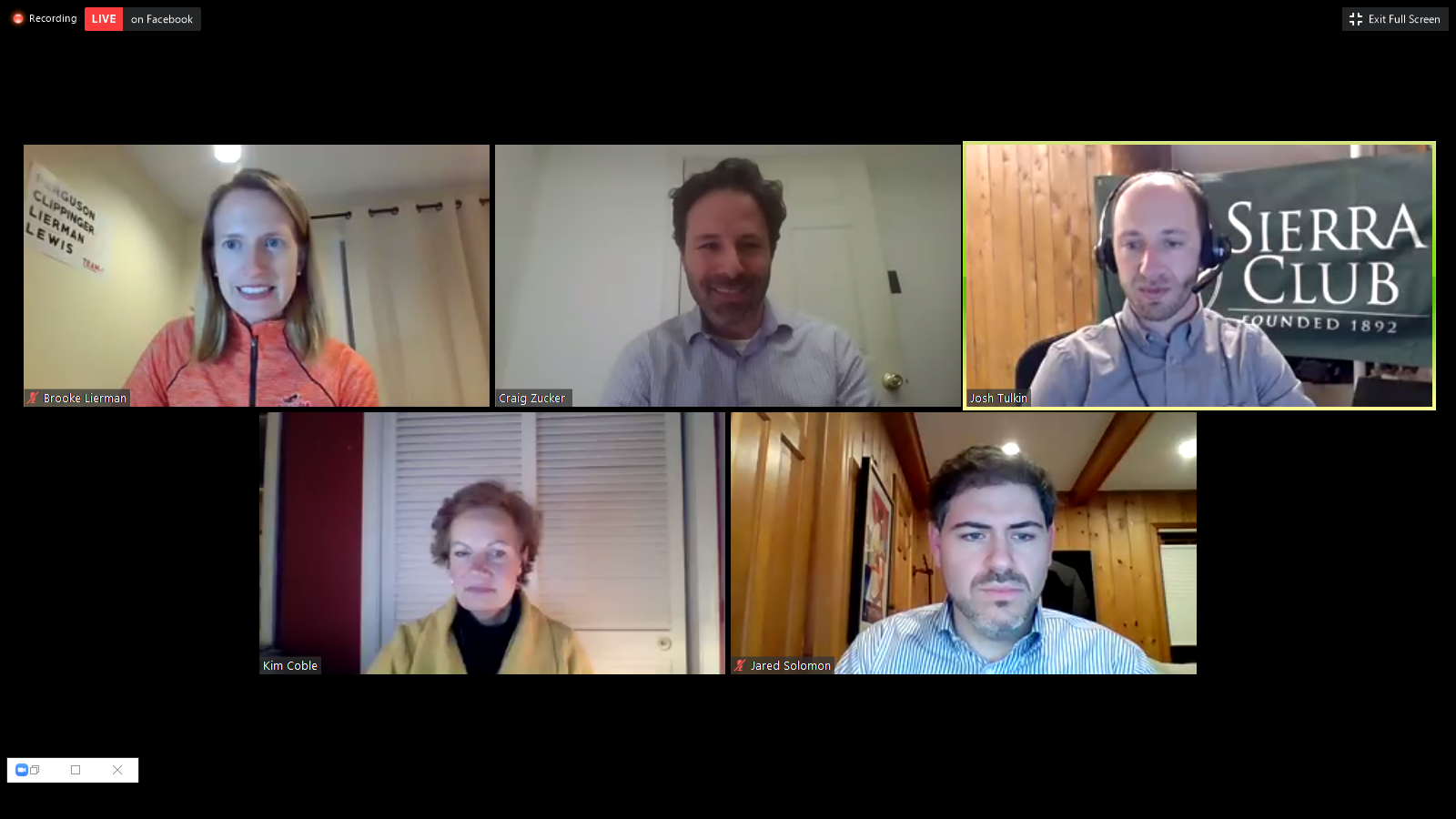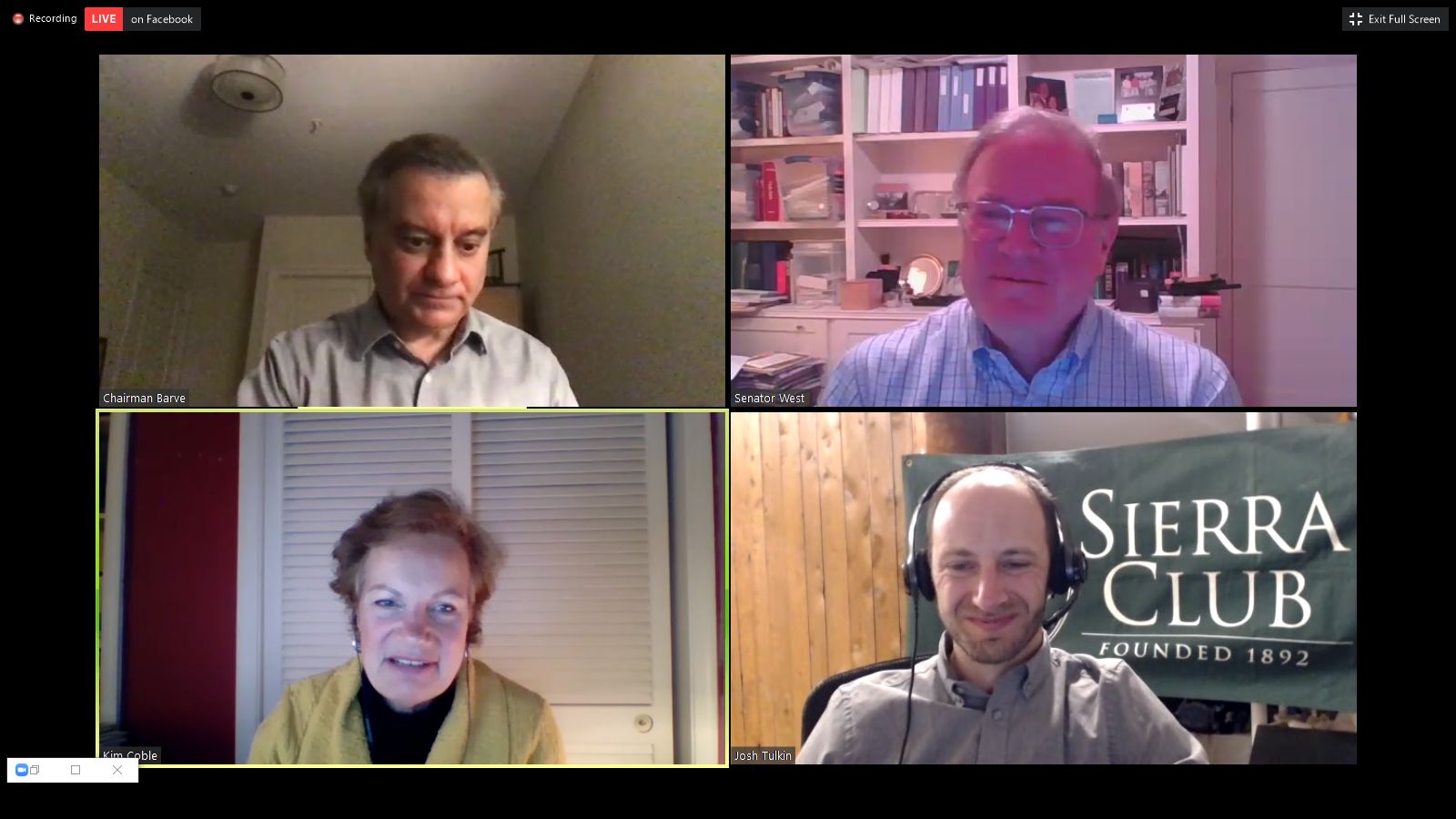April 27, 2020
By Paula Posas
Maryland Sierra Club and League of Conservation Voters began their first joint and first virtual legislative wrap up with shoutouts to environmentally friendly local businesses that some participants had supported by purchasing food and drink to enjoy during the event. Setting the tone for the next 1.5 hours, LCV Executive Director Kim Coble noted the closeness of the event to the 50th anniversary of Earth Day and remarked: "Nelson Mandela said he never lost, he either won or he learned. That's the theme for tonight, we didn't lose these bills. We learned a lot in the process so we're better equipped to hit the next legislative session."
Due to the coronavirus lockdown all hundred plus participants joined the two co-hosts and seven legislators from home. Coble joked that such an enthusiastic response to an 8pm webinar would make an interesting social science study as to "why we're all here."
The fate of the bills
Due to the new co-sponsorship of the event, legislator introductions included not just their time in office, accomplishments, and bills, but their LCV score. All ranked between the 90-100 percentile for their past legislative votes. Senators Chris West, Craig Zucker and Malcolm Augustine were variously paired with Delegates Kumar Barve, Lorig Charkoudian, Brooke Lierman, and Jared Solomon, some of whom they had co-sponsored bills with.
The bills at hand covered such areas as:
- Phasing out Maryland’s six coal-burning power plants with a transition plan for affected workers and communities
- Requiring climate-based decision-making by Maryland’s Public Service Commission for new power plants
- Providing critical funding to create a more reliable and safe transit system
- Tightening controls on the “public-private partnership” funding mechanism for Governor Hogan's proposed expansion of the Capital Beltway and I-270
- Banning single-use plastic bags and requiring retailers to charge at least ten cents for other carry-out bags
Just as the COVID-19 pandemic required the usually festive post-session gathering at Denizens Brewing Co. in Silver Spring to move online, it also forced the early adjournment of the legislative session for the first time since the Civil War.
The legislators almost universally attributed the non-passage of environmental bills to the early adjournment, March 18 instead of April 6. Many bills made it to the Senate but died there due to the greater urgency of passing the budget and coronavirus-related legislation in the remaining days and getting out of town.
Had all these bills passed, Coble stated: "Maryland would have jumped ahead of every other state in the efforts to fight climate change." The good news though, she said was: "We're postured well for the future. We have bills drafted, we tested strategies, and the best news of all, we have some amazing legislative champions."
Transit, highways, coal and plastic bags among hot topics for participants
Four areas received multiple audience questions: transit, public-private partnership bills, the coal bill, and the plastic bag bill.
Several legislators stressed the need to invest in transit once conditions stabilize; MTA ridership has decreased less than other modes. Lierman asserted that if we want people and essential workers to get around and live, we cannot afford to underinvest in transit.
The legislators pointed out how "unbelievably dirty" and polluting coal is to Maryland's environment. Even running only 17 days a year, coal power plants are still the state's most polluting energy source and the second largest source of air pollution in the state after traffic.
When discussing plastic bags, it was noted that only MOMs and Whole Foods would take plastic bags for recycling, but some were incinerated anyway. Maryland Sierra Club Director Josh Tulkin quipped: "That's why reduce comes before reuse and recycle."
Social distancing doesn't mean disengaging from collective action
Many participants were eager to know, what could they do in this situation where people cannot meet in groups and door to door knocking is out of the question. The legislators had answers.
Solomon pointed out that we could be telecommuting for the next three years, we need to keep the public thinking about whether it really makes sense to expand highways in this situation. Public opinion can change given the risks, and when it does, Comptroller Peter Franchot, who is running for governor in 2022, will feel that pressure. Legislators also need to hear from people in their own districts about these issues and their high priority.
Lierman stressed the importance of keeping up with anti-plastic bag op eds, talking with groups about the issue, and staying in touch with local council members and telling them to keep up the good work getting rid of single-use plastic bags.
Charkoudian talked about the power of building broad based coalitions such as for transit, that includes environmental, union, business, transit, and disability rights groups.
The lone Republican on the panel, Senator West, said the power of actually reaching out to Republcan legislators could not be underestimated. He noted how Sierra Club's Tulkin had reached out to him personally. He also pointed to the importance of being willing to compromise on bills to get them through, when the legislature is back in session.


What next still not crystal clear
The co-hosts admitted they are still figuring out what advocacy looks like in this new space and encouraged participants to step up and take initiative, redefine what activism looks like. Share ideas and stay engaged, as fighting to protect our environment has never been more important. The disproportionate impacts of pollution on populations already vulnerable due to lower access to healthcare are having dire health consequences amidst the COVID-19 pandemic.
With so many nontraditional aspects to this wrap up, one thing remained typical: the giving of recognition and thank yous. Though fewer individuals were singled out than usual and there was no clapping or clamor, legislators and the grassroots heavily praised each others' unwavering commitment to a cleaner climate and a healthier Maryland.